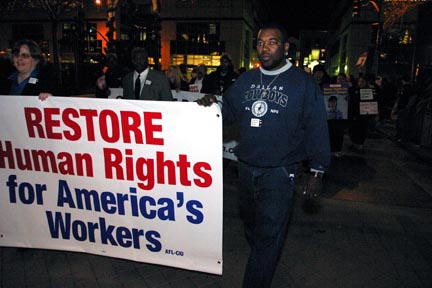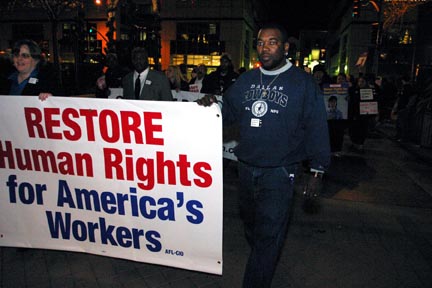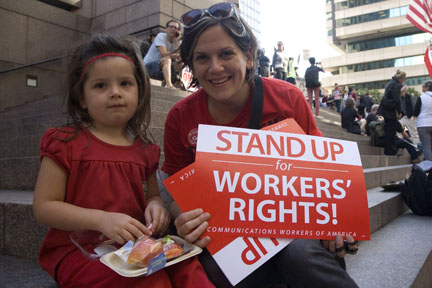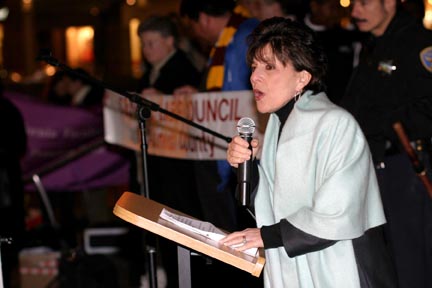
Los Angeles, California – When a private employer, like the Los Angeles Film School (LAFS), decides to fight the efforts of its workers to form a union, there is very little holding it back, despite the rights written into US labor law almost three quarters of a century ago.
The National Labor Relations Act says workers not only have the right to form unions, but that the government encourages them to do so, to level the power imbalance with their employers. The law sets up an election process, in which workers supposedly can freely choose a union. And it says that it's illegal for an employer to fire or punish any worker who uses these rights.
Then there's the reality, as practiced by the LAFS.
That company, set up in 1999 by the former lawyer for Occidental Petroleum, was bought by Florida-based Full Sail Film School in 2003. The film and recording business in Los Angeles has strong, well-respected unions. The studios that are the hoped-for employers for film school graduates negotiate with unions all the time. But the LAFS and Full Sail are not ordinary film schools. They are diploma mills that feed off federal loans taken out by students.
A lawsuit filed last year against LAFS says that students, who pay $18,000 to $23,000 per year tuition for a two-year AS degree, receive much less than promised. The school hands out gift cards to Target and Best Buy, the suit says, to students who list jobs at Apple and Guitar Center stores as “creative positions” on forms submitted to get the college accreditation. That allows the schools to enroll its students in federal loan programs.
Brandii Grace, a digital game designer, moved from Seattle in 2009 when she was offered a contract to teach her skill at LAFS. She took a $2,000 per year cut from her previous job, and was promised $70,000 per year. Her fiancée had to stay behind, but still in their 20s, they decided the prospect of making a life together in the heart of the entertainment world made the sacrifice worth it.
No sooner had she started to teach, however, than the school began making radical changes in the conditions for all its teachers. It cut classes, created new online components, and reassigned teachers to classes where they had no experience. “At first, they promised extra compensation,” she remembers. “Then they said we were being changed from salaried employees to hourly, but that we'd get overtime for the additional work.”
Then, the school announced teachers would only be paid the hours spent in class, cutting most to 8-16 a week. “They weren't going to pay anything for the three hours grading, advising and planning curriculum for every hour we spend in class,” she says. With their income about to plunge, the faculty rebelled. Grace started trying to help people understand what was happening, at first just by distributing the school's own memos. Finally, the school demanded that teachers sign agreements to the new arrangements. In a meeting of instructors, she not only urged them not to do it, but also said they should look for a union.
That was a big step for her. She'd grown up suspicious of unions because of earlier family experiences, but every government agency she contacted told her there was no legal way to stop the new rules if the teachers had no union contract. “We found Peter Nguyen and the California Federation of Teachers (CFT), and he was ready to help us move right away,” Grace recalls. Over the next month they collected union cards, and filed a petition with the National Labor Relations Board (NLRB) with 70 percent of the faculty signed up. Grace was chosen head of the union steering committee.
That was when hell broke loose. The film school hired IRI Consultants, a union-busting firm from Michigan. With their advice, school managers set Grace up to be fired, and prepared a classic campaign of psychological warfare against its own faculty.
“We were immediately told we were all supervisors, and that our salaried status would be restored,” she recalls. Her boss called her in, told her they knew she was the union leader, and threatened her. Suddenly they accused her of not turning in work, of insubordination and even of becoming violent. “They handed me a memo full of lies that were dramatic and extreme,” Grace charges.
She was suspended for three days, and when she came back, she was fired.
It was her 30th birthday, and her apartment lease had just expired.
She didn't give up, though. Other workers would call her at night, telling her how scared they were. The company was holding mandatory meetings to make its union hatred clear, and each teacher was called in for a private chat with her or his supervisor. “Managers would run down the hall screaming at someone, 'you signed the card!'” Grace says she was told.
The union filed charges in March, right after she was fired, and held a protest rally. But six months later, the NLRB still hadn't finished its investigation. The union withdrew its petition for the election because the level of fear was so intense that the right to vote freely had become a joke. The NLRB regional office issued a complaint shortly afterward, charging the school with firing Grace illegally, but it was too late. A hearing was held in January, and in April the hearing officer ruled that the LAFS had violated the law. He ordered Grace reinstated with back pay. The school, however, is appealing the decision to the labor board in Washington, DC, a process that will probably last at least a year. If they have the money and the will, they can then appeal into the court system.
Grace's ordeal is a direct product of this country's weak labor laws, a problem the Employee Free Choice Act (EFCA) was written to correct. That's why large employers, Republicans, and even conservative Democrats have fought the bill in Congress. EFCA would go a long way toward solving the problems Grace experienced.

Workers march in San Francisco calling for passage of the EFCA. (Photo: David Bacon)
If the bill had been passed when Democrats had the presidency and a majority in both houses between 2008 and 2010, it would have been in effect while those meetings were going on in the film school. Grace and the other union committee members could have presented their signed cards to the NLRB, and the school would then have been obligated to recognize the union.
Fear of firing is probably the single biggest reason workers don't organize unions. According to a recent report from the Center for Economic and Policy Research, “Dropping the Ax: Illegal Firings During Union Election Campaigns, 1951-2007,” by John Schmitt and Ben Zipperer, workers were fired for union activity in 30 percent of all union campaigns, so fear isn't unreasonable. “Aggressive actions by employers – often including illegal firings – have significantly undermined the ability of US workers to unionize their workplaces,” according to report co-author Schmitt. “The financial penalties for illegal actions, including firing pro-union workers, are minimal, so it makes perfect sense for employers to break the law to derail union-organizing efforts.” That percentage has gone up from 16 percent in the last 1990s, to 26 percent in the early 2000s, to 30 percent in 2007.
If EFCA had been in effect during the film school campaign, the company would have had to pay triple back wages for its illegal firings. But with no fines and no card-check recognition process, every supporter recruited to the union cause had to weigh the possibility that he or she might lose his or her job. Union supporters say it felt like working in a war zone.

Sara Steffens was fired for leading a union drive at the Contra Costa Times, and now helps other workers get organized. (Photo: David Bacon)
But EFCA didn't pass. In fact, it was never even brought up for a vote.

Workers demand that Congress take a vote on EFCA. (Photo: David Bacon)
So for Grace,, even if the school is found guilty, there's no fine or actual punishment. The school will have to pay back pay for her time out of work, but can deduct any income from another job, or even any unemployment benefits she collects. “My benefits just ran out, though,” she laughs.
Being out of work while continuing to support the union has been an ordeal. After their money ran out, Grace moved in with her mom, and her fiancée had to go live with his family for months in Texas. In addition, Grace had brought her grandmother from Seattle to live with her. “She took care of me growing up, so I take care of her now,” she explains. But she had to put her in a senior home, and then, when she couldn't sleep on her mom's couch anymore, she even slept in her grandmother's room.
Finally, her fiancée came back to Los Angeles, found a job and they got another apartment. “But we almost didn't make it,” Grace says.
So, why should she have to go through this ordeal because a film school, widely called a scam on the Internet, decides to bust a union? “Because the Federal law is broken” Grace concludes. “There's no effective deterrent, no balance sheet they have to worry about. It's no surprise why people are reluctant to do this.”
Maybe she'll get the back pay someday. “But you know, the money's not important to me, really,” she says. “This is about justice. That's what I'm fighting for.”

California Sen. Barbara Boxer speaks at a rally supporting EFCA. (Photo: David Bacon)

California Attorney General Kamala Harris speaks at a rally supporting EFCA. (Photo: David Bacon)
We have 9 days to raise $50,000 — we’re counting on your support!
For those who care about justice, liberation and even the very survival of our species, we must remember our power to take action.
We won’t pretend it’s the only thing you can or should do, but one small step is to pitch in to support Truthout — as one of the last remaining truly independent, nonprofit, reader-funded news platforms, your gift will help keep the facts flowing freely.